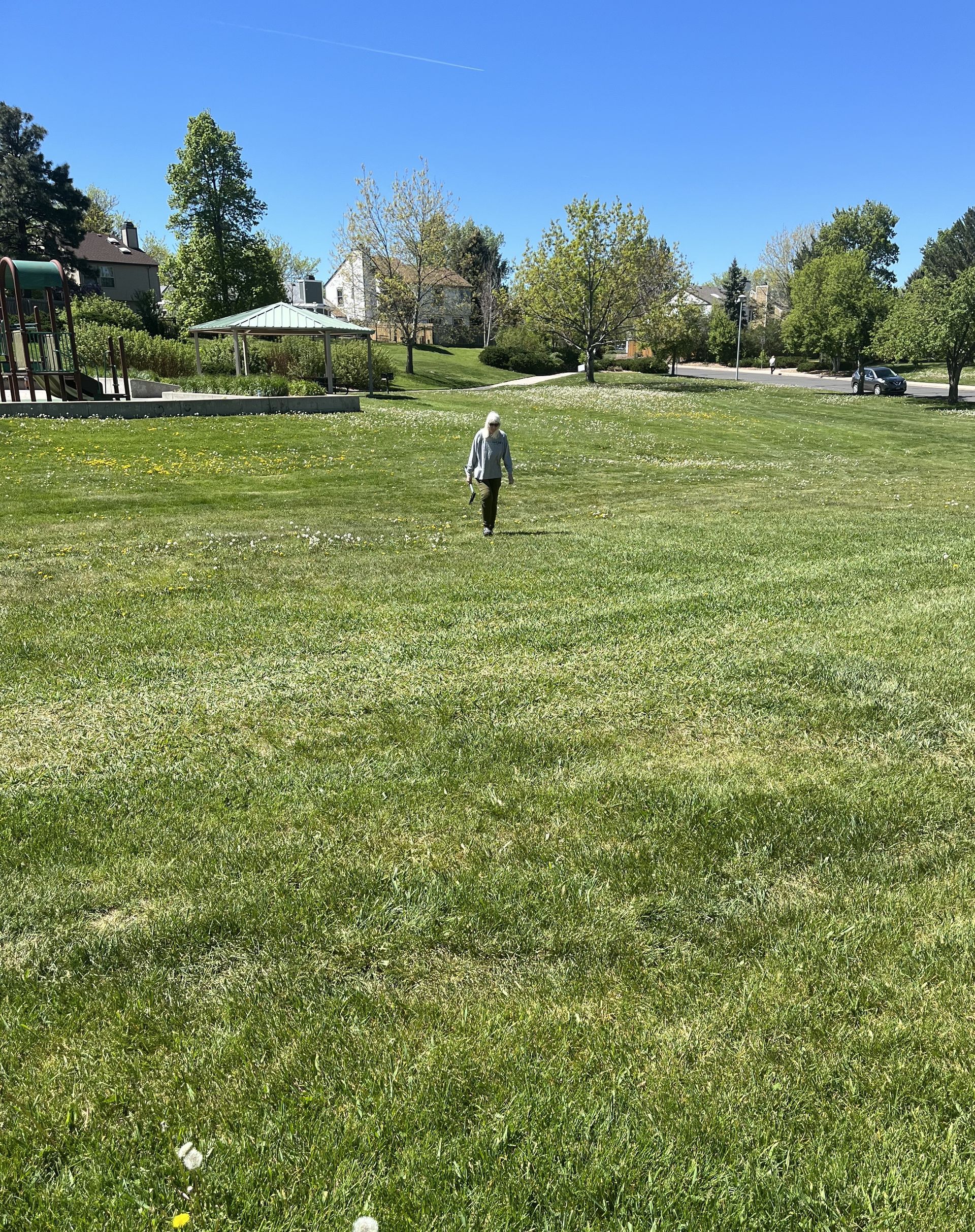Thursday's Columns
May 23, 2024
Our
Story
by
Lawrence Abby Gauthier
ace reporter
The Westphalia Periodic News

Culley Jane's first solo in the park in back of our house less than three weeks after knee replacement surgery
Since we’ve started to get a few more guest columnists and my wife, Culley Jane, the retired professor and novelist is starting to get around pretty good on her own less than three weeks after knee replacement surgery, I’ve been spending more of my writing time working on my novel, Oikos Gnosis.
I’ve written enough. My problem now is where to end it.
It’s about two retirees who’ve worked hard and have enough and meet on an internet dating site. His name is Benny. Her name is Abby. They’re clichés, really, images of a generation shaped by the Idea of Progress beginning to realize that things are not turning out the way they might have expected. He thinks he knows why. She doesn’t want to think about it.
I started writing the novel about twenty years ago shortly after nine-eleven. It didn’t start out as a novel. In a novel you get to make things up. Initially, I thought it was going to be a book about economics where you’re not supposed to make things up. It would explain the world to itself as it really is so it would become obvious to everybody what needed to be done to get to a happy ending.
I started out with what Plato reportedly called “the hypothesis of the higher hypothesis.” That’s the hypothesis that comes to us based on the evidence of our senses, often called the “real world” by regular people, or “ontological existence” by university professors in philosophy departments. The empirical. The physical. What we see with our eyes open as opposed to what we “see” with our eyes closed – the metaphysical.
But appearances can be deceiving. The sun does not orbit the earth. Descartes created a furor and nearly got himself burned at the stake for suggesting that we only “think” we’re the life of the party.
In the dawning years of the 21st century, when I first decided to write a book about economics, it appeared to me empirically obvious that things in general were going downhill. I had something to compare it to. I had personally experienced a time when it seemed like things in general were going uphill, but that now they were going downhill.
All I had to do was look around. I could see that it was harder for my kids and their friends in their generation to make a go of it out on their own in the world. It had been easier for me. Right out of high school, in the mid-60s on our way to the moon, I could have gone right to work at the factory, or gone to one of the iron mines, or into construction, or to the power company and be set for life, union rates, making enough to support a wife, and kids, on my wages, alone… a fishing boat with a 10 hp. Evinrude outboard motor; a camp on a lake in the woods; a house with a backyard with an apple tree with a treehouse and a pension on top of Social Security.
Everybody believed in the Idea of Progress and so it should have been even easier for our kids, but it didn’t seem to be working out that way.
That was my opening hypothesis – that something that had been going uphill was going downhill. Something had happened. What?
I felt like I had to know.
After my book about economics began to morph into a novel, I wrote a whole chapter about the night Benny decided to spend the rest of his life writing a book about what had happened. At the time, my made-up character was working as an over-the-road trucker, but hadn’t always been one. Before he got exiled from the press, he was a newspaper reporter, so he knew that every story had to have a who, what, when, where and why.
He decided to start with the What.
What had happened?
From experience, he knew that to get the What, it usually helped to first get the When. Specifically, had there been a point in time when things in general that had been going uphill started to go downhill?
He went to work to find out.
By then, truckers had internet access out on the road connecting them to a global brain which Benny could probe while parked on exit ramps along the Interstate, or in truck stop parking lots, or in the dark alleyways of warehouse districts, or broke down waiting for a tow truck.
It took him a couple of years of research – not long, really – to figure out the who, what, when and where. He could have ended his book right there and become famous. And he thought about it. But he knew deep down that it would never be finished until he had the Why?
Why would somebody do something like that?
That’s when he realized he would have to turn his book about economics into a novel. He would have to make things up because he would have to journey to a metaphysical place he could only imagine; into their minds to see with their eyes to get the Why?
He would have to become.
That’s when I decided to create Abby to help Benny get back with his soul intact.
